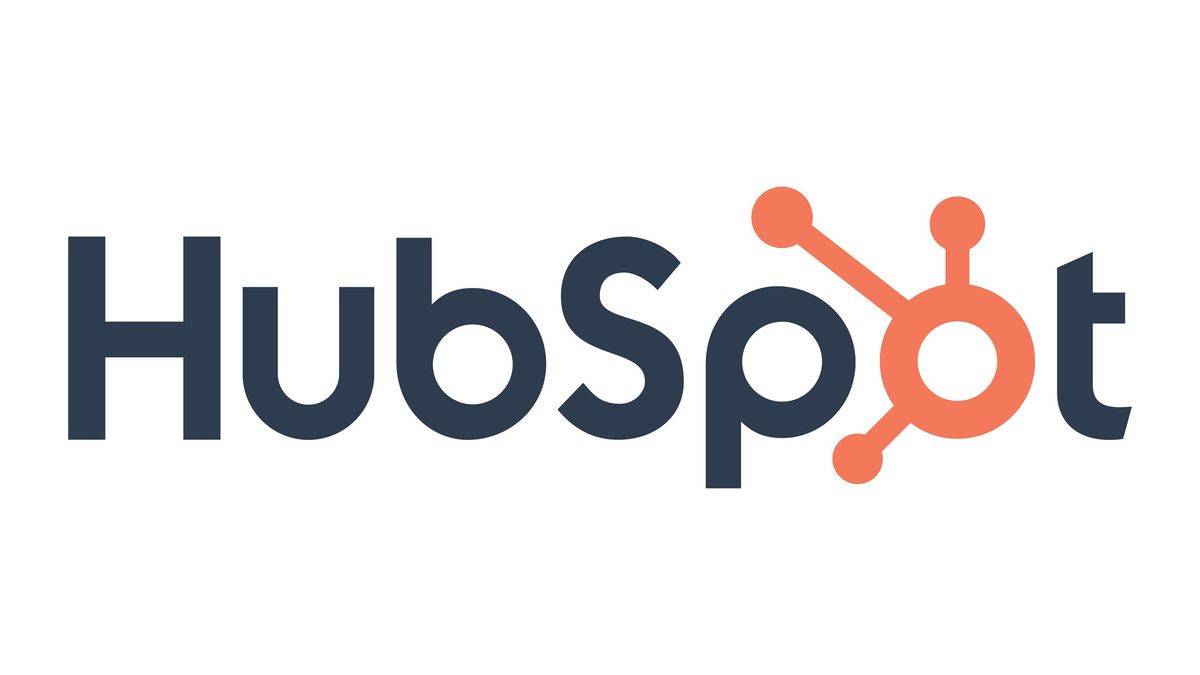TechRadar Verdict
HubSpot CRM is a user-friendly and feature-rich platform that offers exceptional value for small to medium-sized businesses. While prices can add up quickly when it comes to the higher-tier plans, its free offering and entry-level plans still offer unparalleled value.
Pros
- +
Solid core features for sales and marketing
- +
Extensive integration options through app marketplace
- +
Generous free plan that supports a million contacts
Cons
- -
Difficult to scale due to pricier top-tier plans
- -
Reporting capabilities may not be granular as some
- -
Live support not available for all users
Why you can trust TechRadar
As an all-in-one platform, HubSpot centralizes all your marketing, sales, customer service, and content management needs with a focus on inbound techniques. The platform is considered to be one of the best CRM platforms on the market. Over 30,000 organizations across 90 countries have adopted HubSpot CRM, making it an exceedingly popular choice among small businesses.
After putting the CRM through its paces, I've found it to be a robust and intuitive solution for organizing contacts, tracking deals, and gaining visibility into the sales process. The interface is clean and easy to navigate, with helpful features like email tracking, meeting scheduling, and live chat that streamline communication with leads and customers.
If there was one thing to say against HubSpot CRM, it’s the fact that the software can get quite expensive as you scale your business. While the free offering and generous entry-level plans offer a great starting point for new businesses, it’s easy to end up paying for things you don’t need as your business grows.
HubSpot CRMs core capabilities
HubSpot CRM delivers the essential features I expect from a customer relationship management system. I can store up to 1 million contacts and companies in the CRM for free, with each record capturing important details like contact info, website, social media profiles, industry, revenue, and more. When you add a contact, HubSpot automatically populates key details about their company, saving data entry time.
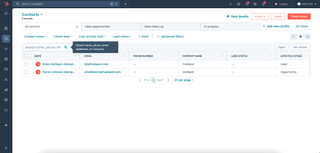
Segmenting contacts into lists based on any criteria is simple with HubSpot's powerful filtering tools. I can easily create dynamic lists that automatically update as contact properties change. For example, I set up a list of contacts from companies with 500+ employees who have visited my pricing page in the last month.
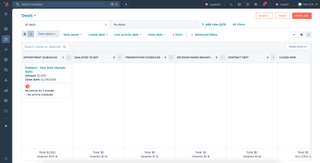
Deals and tasks keep things organized as you manage leads through the pipeline. I can create deal stages that mirror my sales process, drag and drop deals from one stage to the next, and easily see the value and quantity of deals in each stage. Tasks ensure critical to-dos never slip through the cracks. I can assign tasks to team members, associate them with specific deals or contacts, and set due dates.
For those who rely strongly on inbound, HubSpot's built-in prospecting tool is useful for identifying new leads who are engaging with your website. It shows me which companies visited my site, even if they haven't filled out a form yet, and provides key details about those organizations pulled from HubSpot's database. I can review prospects and add promising leads to the CRM with one click.
Reporting features give me a clear picture of my sales pipeline and team performance. The dashboard displays my deal forecast, number of deals created and closed, productivity metrics, and more. I can dig into reports to see deals won and lost, sales leaderboards, and individual rep performance. Reports are easy to filter and customize.
Email tracking and templates help my team communicate efficiently with leads and customers. I can see who opened an email, clicked a link, or downloaded an attachment, then follow up accordingly. Templated emails save time on common messages. The Gmail and Outlook integrations allow me to log emails to the CRM and access templates, tracking, and more without leaving my inbox.
Live chat is another channel for real-time conversations with website visitors. I can configure targeted messages to specific web pages or audience segments. Chatbots help qualify leads and schedule meetings 24/7. All chat conversations are automatically saved in the CRM.
Finally, the mobile app gives me access to key CRM data and features on the go. I can look up contacts, update deals, track emails, and more from my smartphone. This is invaluable when traveling or walking into a meeting.
Beyond the essentials, HubSpot CRM includes some handy tools that enhance productivity. The email integration with Gmail and Outlook is fantastic - I can track email opens, log sent emails to contact records, and create new contacts directly from my inbox. The meeting scheduler makes it painless for prospects to book time on my calendar, eliminating the usual back-and-forth. I also get a lot of value from the task reminders and automated workflows that keep me on top of follow-ups and outreach.
While the free HubSpot CRM is generous with its features, upgrading to one of the paid Sales Hub plans unlocks even more advanced capabilities like sales automation, predictive lead scoring, smart notifications, custom reporting, and more. But for many small businesses and sales teams, the free version provides the core tools needed to organize customer data and manage deals efficiently in one centralized system.
How easy is HubSpot CRM to use?
From the moment I first logged into HubSpot, I found the dashboard to be clean, well-organized, and easy to understand. Whether working on contacts, deals, tasks, or reports, the layout and controls remain familiar and intuitive. The main navigation menu is clearly labeled and logically structured, making it simple to find the tools and data I need. The design consistency reduces cognitive load and allows me to move between various areas of the CRM without having to relearn the interface each time.
HubSpot provides a wide range of options for tailoring the CRM to my specific needs, but it does so in a way that is approachable and straightforward. I can easily add custom fields to contact and deal records, create personalized views, and build custom reports and dashboards without needing extensive technical skills. The drag-and-drop interface for building workflows and deal pipelines is particularly user-friendly, enabling me to automate processes and visualize my sales funnel with minimal effort.
When it comes to onboarding and training, HubSpot offers a wealth of resources to help new users get up to speed quickly. The HubSpot Academy provides a comprehensive library of courses, certifications, and tutorials that cover every aspect of the CRM. I found the courses to be well-structured, engaging, and practical, with a mix of videos, quizzes, and hands-on exercises. The in-app guidance and tooltips are also helpful for discovering new features and understanding best practices.
It's worth noting that HubSpot's ease of use extends beyond the core CRM functionality. The platform's integration with tools like Gmail, Outlook, and Google Calendar is seamless, allowing me to manage my email and schedule without leaving the CRM. The mobile app is also well-designed and provides access to all the essential features, enabling me to stay productive on the go.
Overall, HubSpot CRM really sets the standard for ease of use in the CRM space. Its intuitive interface, consistent design, and customization options make it accessible to users of all skill levels. The comprehensive onboarding resources and rapid time-to-proficiency ensure that teams can start realizing value from the platform quickly. While there may be a learning curve for some of the more advanced features, HubSpot's commitment to usability makes the journey smoother and more enjoyable than with many other CRM systems I've used.
HubSpot CRM integrations
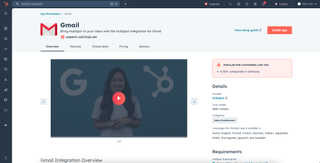
HubSpot offers a wide range of pre-built integrations with popular business applications, making it easy to connect your customer data with the rest of your tech stack. The HubSpot App Marketplace is a treasure trove of integrations, with over 1,000 apps across various categories like marketing, sales, customer service, and more. I was able to quickly find and set up integrations with Mailchimp, Slack, and Zendesk. Setting up these integrations was a breeze — most required just a few clicks and minimal configuration.
While the pre-built integrations cover a wide range of popular apps, there may be instances where a specific integration is not available out-of-the-box. In such cases, HubSpot's integration with Zapier is a major lifesaver. Zapier is an automation platform that allows for connecting HubSpot with over 3,000 apps. I was able to set up a custom workflow that automatically creates a task in my project management tool whenever a new lead is added in HubSpot, all without writing a single line of code.
For more complex integration needs, HubSpot provides a robust API that allows for custom integrations. API documentation is comprehensive and includes code examples in various programming languages. I also haven't encountered any significant issues with API performance. On the rare occasion when I did need assistance, HubSpot's support team was responsive and helpful in resolving the issue promptly.
Beyond all this, I also appreciate HubSpot's focus on data sync performance. The platform uses a two-way sync that ensures data consistency across integrated apps. Changes made in HubSpot are automatically reflected in the connected tools. I don’t have to worry about manually updating information in multiple places or dealing with conflicting data. Data sync capabilities extend beyond just syncing contact and deal information. For example, the platform also allows for syncing of marketing assets, such as email templates and landing pages.
How good is HubSpot customer support?
When implementing a new CRM system, having access to responsive and knowledgeable customer support is crucial. During my experience with HubSpot CRM, I appreciated the variety of support channels offered here.
However, it's worth noting that the level of support can vary depending on your subscription tier. While all users have access to the Knowledge Base and Community Forums, live support channels are limited to Professional and Enterprise tiers.
With a Professional or Enterprise subscription, I have access to phone, email, and chat support. The support representatives are friendly, knowledgeable, and always willing to go the extra mile to resolve my issues or answer my questions. The average first response time for support inquiries is impressively short, often within an hour or two for email or chat and immediate for phone support.
Beyond live support, HubSpot offers an extensive library of self-service resources. The HubSpot Academy is a standout, providing a wealth of courses, lessons, and certifications on every aspect of the CRM. I've found the courses to be well-structured, informative, and engaging, with practical examples and hands-on exercises. The Knowledge Base is another powerful self-service resource, offering a searchable database of articles, tutorials, and FAQs.
When these resources prove insufficient, HubSpot also maintains an active community forum where users can ask questions, share best practices, and learn from each other. This is a great place to ask questions that haven’t been covered in the other self-help resources. Personally, I've found the community to be welcoming, knowledgeable, and eager to help.
When it comes to overall customer satisfaction, HubSpot consistently receives high marks. The company is transparent about its customer satisfaction scores (CSAT), which typically fall between 75% and 85%. This is a strong indicator that the majority of users are happy with the support they receive.
HubSpot CRM: Plans and pricing
| Plan | Free | Starter | Professional | Enterprise |
| Price | $0/user/month | $15/user/month | $90/user/month | $150/user/month |
| Best for | Small businesses or startups testing the waters | Growing businesses seeking basic marketing and sales tools | Experienced teams needing advanced features | Large enterprises with complex requirements |
| Features | Basic CRM functionality; Contact management; Email tracking | Email marketing; Sales automation; Content management tools | Omnichannel marketing automation; Custom reporting; Sales analytics | Custom solutions; Advanced security features; Multi-domain reporting |
| Limitations | Limited automation and no advanced features. | No workflow automation or advanced reporting. | Significant price jump from Starter. | an be costly for smaller organizations. |
While it may not be the cheapest option on the market, HubSpot offers a compelling blend of features, flexibility, and scalability that justifies its pricing. That said, prices can add up quickly when you’re on one of the higher tier plans, so you’d best stick to the features you need.
Unlike many other CRM providers, HubSpot actually offers a fully functional CRM at no cost, with unlimited users and up to a million contacts. This free tier includes essential features like contact and deal management, email tracking, and live chat. It's a great way for businesses to get started with a CRM without any investment.
Once your business has outgrown the free CRM, you can choose between a range of plans across different modules like the Sales Hub, the Service Hub, or the Marketing Hub. Each plan adds on to the capabilities of the free CRM with enhanced features unique to that module.
For example, Sales Hub Starter includes support for multiple currencies, along with esignature software and the ability to perform simple automations. Similarly, Marketing Hub Starter offers access to live chat integrations and email marketing support. Prices usually start from $15/user/month for the Starter plan for each Hub, going all the way up to several thousand dollars per month for enterprise customers.
For businesses looking to bundle multiple HubSpot products, the Customer Platform offers a discounted price that packs together essential features from the Marketing Hub, Sales Hub, Service Hub, CMS Hub, and Operations Hub into a single plan. This bundle is ideal for enterprise businesses that want to leverage the full power of HubSpot's ecosystem.
For new customers, HubSpot offers a generous 14-day trial, plus discounts and bundles that can provide significant savings. For example, they offer a 25% discount for startups and a 40% discount for nonprofits.
HubSpot CRM review: Final verdict
After thoroughly evaluating HubSpot CRM across multiple criteria, I believe that this is a solid CRM for small and medium sized businesses, offering a robust set of features for contact management, deal tracking, and sales automation.
HubSpot’s user-friendly interface and design make it easy for teams to learn, with responsive live channels and comprehensive self-service resources to iron out any hiccups during initial adoption. I also liked the amount of flexibility offered in integrating the platform with other workplace productivity tools, with options ranging from built-in connectors to iPaaS vendors to a custom API.
However, while this is a solid platform for businesses of any size, it’s not without its shortcomings. For example, the existence of support tiers makes it impossible to receive live assistance as an entry-level paid subscriber. But on higher-tier plans, prices can quickly add up depending on the number of users, making the partnership less than sustainable.
Still, HubSpot CRM should fit the needs of most small-to-medium enterprises, especially with its generous free plan that offers near-unparalleled value in the world of CRMs. For larger organizations, thorough cost calculation is necessary to prevent overspending on unnecessary licenses or features.
Ritoban Mukherjee is a freelance tech and innovations journalist from West Bengal, India. His work focuses on reviews, guides, and features about consumer and business software, such as AI website builders and CRM platforms, among other things. He has been published on Tom's Guide, TechRadar, Creative Bloq, IT Pro Portal, Gizmodo, Medium, Quartz, and Mental Floss.
- Owain WilliamsB2B Editor, Website Builders & CRM
You must confirm your public display name before commenting
Please logout and then login again, you will then be prompted to enter your display name.
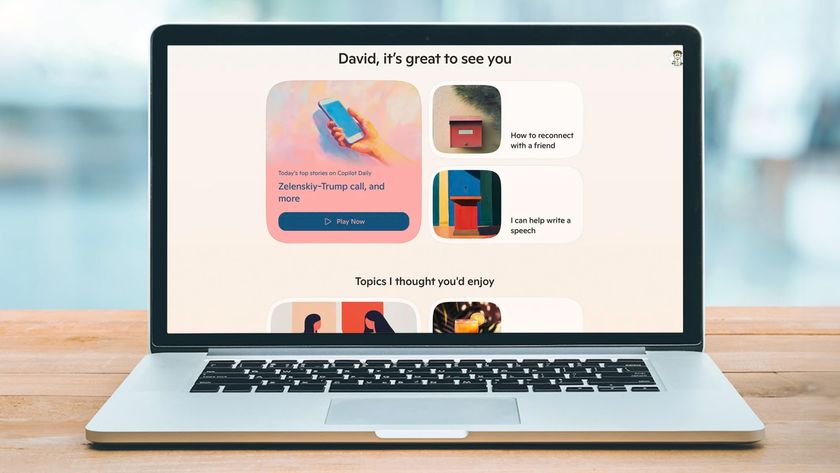
What is Copilot: Microsoft’s AI chatbot isn't just for Windows users

Excited for Ransom Canyon on Netflix? Here are 3 western shows with over 80% on Rotten Tomatoes to watch while you wait

Microsoft crowbars new ‘recommendations’ for PC Game Pass into Windows 11, so excuse me while I start beating my anti-advert drum (again)
Most Popular






